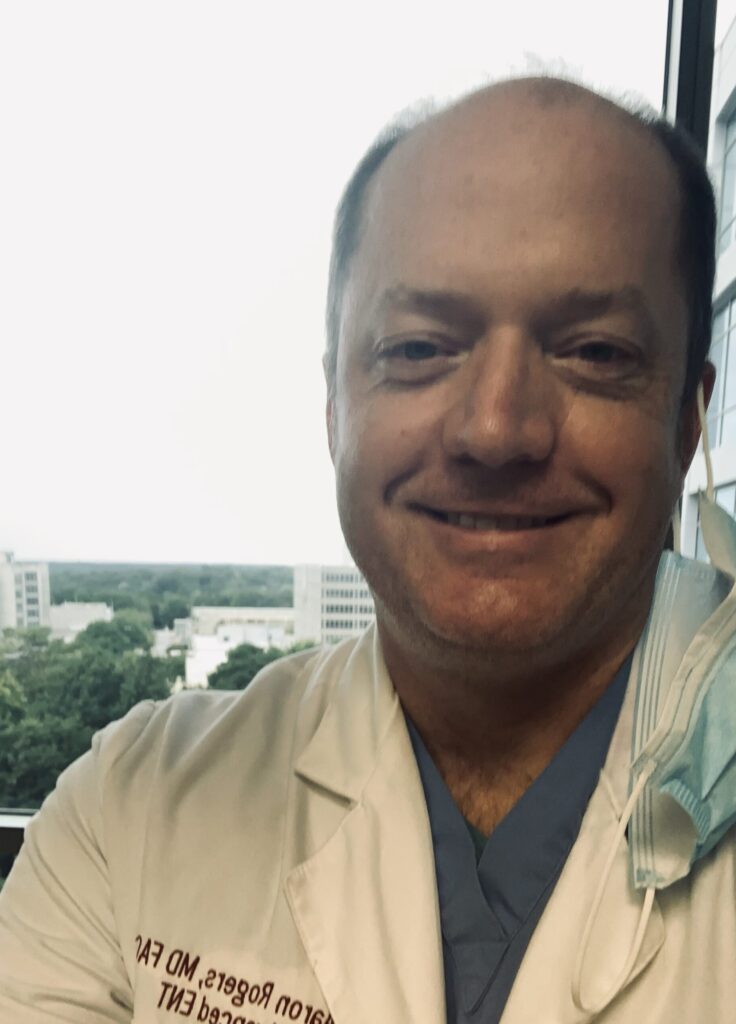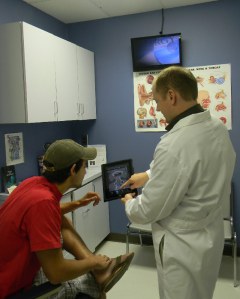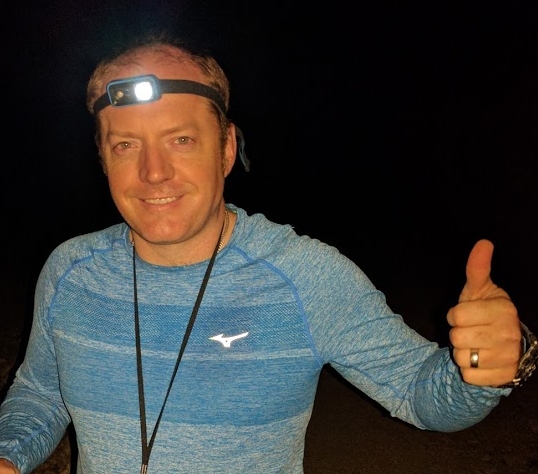
G. Aaron Rogers, MD FACS
SINUS | SLEEP | HEARING | book now | my posts
Dr. Aaron Rogers is a local leader in the treatment of nasal and sinus disorders. He trained at Emory University completing hundreds of sinus procedures under the supervision of academic rhinologists and endoscopic neurosurgeons there. His research centered on nasal polyposis and chronic sinusitis in addition to studying the effects of topical glucocorticoids (steroids) on the nasal and respiratory tissues. Dr. Rogers joined Advanced ENT in 2010 and proudly calls Atlanta his home.
NASAL & SINUS
Deviated Septum and Sinus Surgery. Unresponsive sinus infections, or nasal blockage due to cartilage deviation and trauma are still the most common surgical cases for Dr. Rogers. Endoscopic sinus surgery, nasal septoplasty surgery, turbinate surgery and nasal valve surgery make up the majority of Dr. Rogers’ surgical cases. In our office this is usually considered a final step, not a first step, after other medical treatments have been tried and simpler options considered. Nasal and sinus surgery is very effective at improving breathing quality and reducing the frequency and severity of sinus infections.
ENT Allergy Program. Dr. Rogers built and oversees the Otolaryngic Allergy program, offering allergy testing and modern allergy treatment options (such as “Allergy Drops“ or sublingual immunotherapy) for patients suffering from nasal and pharyngeal allergy symptoms. Diagnostic olfactory (smell) testing is also performed.
Balloon Sinuplasty. The first in-office balloon sinuplasty was done by Dr. Rogers in 2010, kicking off an era of in-office sinus procedures related to Balloon Sinus Dilation. We now do a number of these, as this technology (and our experience) has allowed many patients avoid the operating room to get their sinuses treated. He has made this a meaningful part of the treatment options offered to patients suffering from chronic sinusitis and nasal congestion.
Non-Allergic Rhinitis. In 2017, Georgia’s first cryotherapy procedure for vasomotor rhinitis was performed by Dr. Rogers. He uses the cryotherapy tool as well as a different radiofrequency therapy, to address chronic nasal congestion and drip. This technique has now gained insurance coverage from many plans as it has stood the test of time!

SNORING & SLEEP APNEA
In addition to full diagnostic testing managed in-house, we have the range of treatment options available. This can include in office procedures such as snoreplasty, custom oral appliance therapy, or even larger surgeries on the nasal and throat airways in the operating room.
CPAP or BiPAP therapy though remains the most successful long term treatment for the majority of patients with moderate or severe sleep apnea. This also avoids surgery. This became clear years ago, pushing our office to establish full service dispensing and service of CPAP equipment and supplies. We have a full time sleep tech staffing our office to assist and troubleshoot equipment issues. Most CPAP billing is done through insurance, but we also have self pay options when insurance just won’t work.
Oral Appliance Therapy. Custom-fit mouthguards to help project the lower jaw forward during sleep are an excellent option for patients with mild sleep apnea, simply snoring, or who cannot tolerate a CPAP machine. The custom devices are adjustable and usually are very well tolerated by patients. We always check a follow-up sleep test to fully measure their success.
Snoreplasty, Palate RFA, Pillar implants. The chemical snoreplasty procedures are offered to appropriate patients, usually thin adults with lengthy palates who snore but do not have sleep apnea. This is a small in-office procedure that stiffens the palate to reduce “flippiness” and therefore reduce snoring. RFA is similar.
EUSTACHIAN TUBE & HEARING LOSS
Full hearing and ear evaluations. Critical for making a good ear diagnosis is high quality diagnostics, which includes audiologist-performed hearing testing, video otoscopy and at times advanced radiology imaging like CT or MRI scans.
Eustachian Tube Dysfunction, Balloon Dilation, Eustachian Tuboplasty. Our ear’s own pressure regulation is critical to how we feel and how we hear. Many times also affecting balance. Dr. Rogers performs video-guided treatments of the eustachian tube to help with pressure regulation–whether its an ear thats clogged, muffled, popping, clicking or getting infected
Hearing aids? Some of our patients benefit from hearing aids or “amplification” of some kind. There are many new options on the market. We offer full service hearing aid treatment, working hand in hand with Audiologists dedicated to these therapies.
Dr. Rogers has written several scientific publications, editor of a nationally-distributed pocket guide for ENT trainees, and authored a chapter in the textbook Skull Base Surgery Techniques and Concepts. Additionally he has presented medical research at many recent leading national scientific conferences
Dr. Rogers is a member of the American Academy of Otolaryngology – Head & Neck Surgery, American College of Surgeons, the American Academy of Otolaryngic Allergy, and the Georgia Society of Otolaryngology. Dr. Rogers completed ear nose and throat residency program and internship at Emory University. He grew up in Florida, attending Florida State University and the University of South Florida for college and medical school.

Local hospital affiliations include Northside Hospital, Atlanta Outpatient Surgery Center, St. Joseph’s Health Center, Children’s Healthcare of Atlanta at Scottish Rite and Meridian Mark Surgery Center.
Dr. Rogers’ personal interests include outdoor activities and spending time with his family. When not at work he can usually be found running, hiking, biking or planning his next trek.
Publications:
- Rogers G. A. (2023). “Expansile Sphenoid Mycetoma Presenting With Headache and Galactorrhea.” JAMA otolaryngology– head & neck surgery, 149(2), 181–183
- Rogers, G Aaron et al. “Epithelial tight junction alterations in nasal polyposis.” International forum of allergy & rhinology vol. 1,1 (2011): 50-4. doi:10.1002/alr.20014
- Wise SK, Rogers GA, et al. “Radiologic staging system for allergic fungal rhinosinusitis (AFRS).” Otolaryngology–head and neck surgery : official journal of American Academy of Otolaryngology-Head and Neck Surgeryvol. 140,5 (2009): 735-40. doi:10.1016/j.otohns.2008.12.053
- Zuckerman JD, Rogers GA, et al. “The utility of cadaver dissection in endoscopic sinus surgery training courses.” American journal of rhinology & allergy vol. 23,2 (2009): 218-24. doi:10.2500/ajra.2009.23.3297
- Rogers, G Aaron et al. “Inferior meatus endoscopy and directed treatment for epiphora: early experience with a novel approach.” Otolaryngology–head and neck surgery : official journal of American Academy of Otolaryngology-Head and Neck Surgeryvol. 140,4 (2009): 579-84. doi:10.1016/j.otohns.2008.12.009
- Moore, Charles E, and G Aaron Rogers. “Contemporary considerations in cranial-base surgery.” Medscape journal of medicine vol. 10,12 (2008): 272.
- Rogers, G Aaron, and John M DelGaudio. “Inferior meatus dacryolith: an easily managed cause of epiphora.” Archives of otolaryngology–head & neck surgery vol. 134,10 (2008): 1110-1. doi:10.1001/archotol.134.10.1110
- Rogers GA, et al. “Methicillin-resistant Staphylococcus aureus orbital abscess in a neonate.” Int J Pediatr Otorhinolaryngol Extra. 2007;2:99–101
- Back MR, Rogers GA, et al. “Magnetic resonance angiography minimizes need for arteriography after inadequate carotid duplex ultrasound scanning.” Journal of vascular surgery vol. 38,3 (2003): 422-30; discussion 431. doi:10.1016/s0741-5214(03)00794-8
- Okhuysen PC, Rogers GA, et al. “Antibody response of healthy adults to recombinant thrombospondin-related adhesive protein of cryptosporidium 1 after experimental exposure to cryptosporidium oocysts.” Clinical and diagnostic laboratory immunology vol. 11,2 (2004): 235-8. doi:10.1128/cdli.11.2.235-238.2004
